Index
The Golden Era
Movies reviewed in this section:
Angels in the Outfield (1951): 3.7 WAR
Big Leaguer (1953): 2.3 WAR
Fear Strikes Out (1957): 3.1 WAR
The Jackie Robinson Story (1950): 3.5 WAR
The Stratton Story (1949): 4.4 WAR
What defines the Golden Era? In baseball terms, this would be the period after integration and before expansion, a relatively short and narrow window but one that is appropriate as these five movies were all released in a less than ten-year span.
In movie terms, this also corresponds to baseball chronology but it also reflects a more concerted emphasis on realism and credibility. Four of the five movies are based on actual baseball personages, and while the fifth is not only fictional but is fantastical, it features credible baseball action while the off-field story, designed expressly to be touching, is both unconventional and free of conventional sentiment.
Notably, the four movies based on actual baseball figures all abandon the rich sentimentality of the Vintage Era, with all of them spotlighting realistic adversity, whether physical or mental hardship, racism, or simply the sheer effort it takes to reach the Major Leagues.
Leading off is The Jackie Robinson Story (3.5 WAR), unusual in the sense that it stars its very subject and was made at the height of Robinson's historic career as the first African-American player in 20th-century Major League Baseball, a courageous feat as he endured tremendous racial abuse to pave the way for African-American ballplayers. The Jackie Robinson Story soft-pedals much of that to yield an inspirational story, although it cannot ignore that reality as it presents a reasonably accurate portrayal of Robinson's travails through to his rookie season with the Brooklyn Dodgers.
The script by Arthur Mann and Lawrence Taylor mixes grit with the gloss: Shown encouragement as a boy, Jackie becomes a four-sport star at UCLA, where his older brother Mack (Joel Fluellen) also starred—although Mack's college degree cannot help him professionally, which also plagues Jackie even as he meets nursing student and future wife Rachel "Rae" Isum (Ruby Dee). After a stint in the Army—also sanitized here, as he had been court-martialed as a result of racial prejudice—Robinson barnstorms in the Negro Leagues until Brooklyn's general manager Branch Rickey (Minor Watson), looking for a black player with both temperament and talent, signs him to an MLB contract.
The Jackie Robinson Story focuses on Robinson's apprenticeship with Brooklyn's farm team the Montreal Royals, where he learned to withstand the growing racial abuse before jumping to the Dodgers in 1947. Veteran character actor Watson delivers the best performance as his Rickey emerges alongside Robinson, who is serviceable as the star, with Dee and Louise Beavers, portraying Robinson's mother, carrying water while director Alfred Green steers the workmanlike narrative that keeps the themes of intolerance and acceptance visible throughout. Also workmanlike is the baseball action, although The Jackie Robinson Story transcends the box scores to illuminate a nobler contest.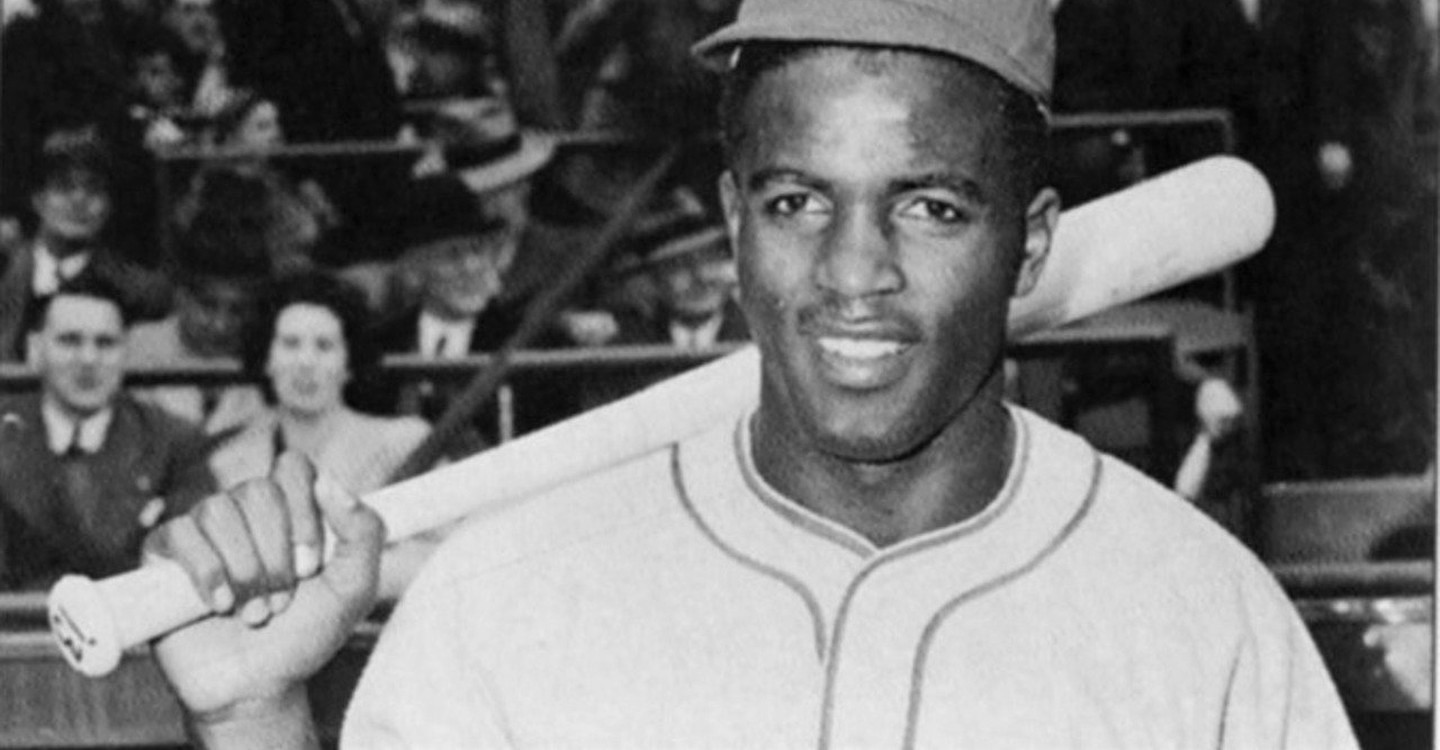
We hope he didn't have to research the character too much: Jackie Robinson portrays himself in The Jackie Robinson Story. Not the only time we'll see a Jackie Robinson movie.
Of course, despite his daunting obstacle, Jackie Robinson flourished in the Major Leagues to become a Hall of Famer, but many players with none of the social and racial burdens Robinson faced never even make it to the Majors—and as Big Leaguer (2.3 WAR) demonstrates, often it can be a challenge even making it into the minor leagues. This earnest, journeyman baseball story, scripted by Herbert Baker from a story by John McNulty, offers an unusual glimpse at players trying to win a $150-a-month minor-league contract, which in turn could lead them to the Majors. Or not.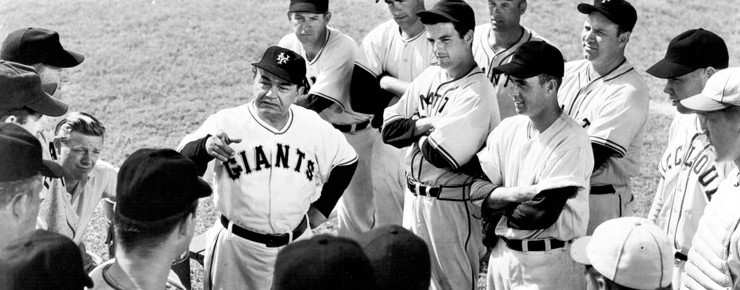
Hoping to make the grade even at the minor-league level: Edward G. Robinson as Hans Lobert, assessing potential Major League talent for the New York Giants in Big Leaguer.
Former big-leaguer Hans Lobert served as the technical advisor for Big Leaguer; he is portrayed by the unlikely Edward G. Robinson, who runs a training camp for the (then-) New York Giants. Among the young hopefuls are Bobby Bronson (Richard Jaeckel), Julie Davis (William Campbell), Tippy Mitchell (Bill Crandall), and Chuy Aguilar (Lalo Rios), although the prime prospect is strapping Adam Polachuk (Jeff Richards, a former minor leaguer), who catches the eye of Christy (Vera-Ellen), Lobert's niece from the Giants' front office, even as the brooding third baseman harbors a family secret that affects his play.
As Lobert whips the prospects through their paces—although dubious as a former ballplayer, Robinson nevertheless is a five-tool actor—many will inevitably not make the cut for the obligatory final game with its equally predictable heroics. Captured in William Mellor's black-and-white cinematography, the on-field action looks credible enough—these are prospects not yet fully formed—although the off-field dramatics are less so: Polachuk's romance with Christy is tepid contrivance, and his confrontation with his father (Mario Siletti) is just as pat, while other attempts to add dimension to the characters—Aguilar's halting English, Davis's braggadocio, Bronson's cut from the squad—are perfunctory and obvious.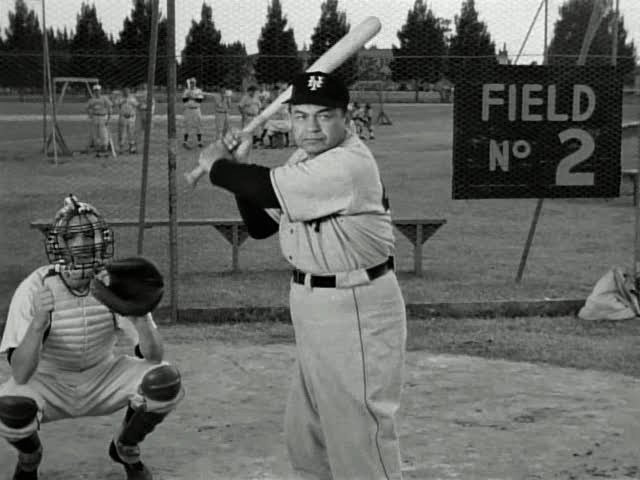
Pretty dubious as a ballplayer, even a retired one, Edward G. Robinson was still a five-tool actor.
Yet Big Leaguer does convey a feel for the game's hard realities, abetted by appearances from Brooklyn Dodgers coach Al Campanis and Hall of Fame pitcher Carl Hubbell, the Giants' real-life director of player development at the time. The film also marks rookie Robert Aldrich's debut as a director (Kiss Me Deadly, The Dirty Dozen, The Longest Yard) in the cinematic majors, and while Big Leaguer doesn't make the cut, there's always next year.
But even if a player makes it to the Majors, any number of misfortunes could strike beyond simple performance issues, as the next two movies illustrate. For Monty Stratton, a strapping right-hander who was beginning to blossom as a starting pitcher for the Chicago White Sox, turning in back-to-back 15-win seasons in 1937 and 1938 while posting a sterling 2.40 ERA with five shutouts in 1937 during a period of high offense, an offseason hunting accident ended his Major League career: Hunting rabbits on his family farm in November 1938, Stratton fell and accidentally discharged his shotgun, severing an artery in his thigh that forced the amputation of his right leg.
However, that is not the end of The Stratton Story (4.4 WAR) because, as portrayed by James Stewart, Monty Stratton, fitted with a prosthetic leg, continued to pitch in the minor leagues from 1946 to 1953. Stewart embodied a distinctive American male archetype, modest but determined, decent but quietly defiant in the face of adversity, and it is that pluck that drives Douglas Morrow and Guy Trosper's script, which won a Best Story Oscar, as director Sam Wood, recalling his approach from Pride of the Yankees, puts Stewart and June Allyson squarely at the center of this sentimental yet effective biopic.
Allyson portrays Ethel, whom Monty meets soon after making the White Sox thanks to scout Barney Wile (Frank Morgan), a washed-up catcher looking to get himself back into the majors. Barney poaches Monty from his Texas farm and his skeptical mother (Agnes Moorehead, a crucial lineup fixture if ever there was one), who relents when Monty returns with Ethel, now his wife and mother of their infant son, as his big-league career seems to be in full swing, at least until Monty accidentally shoots himself in the leg.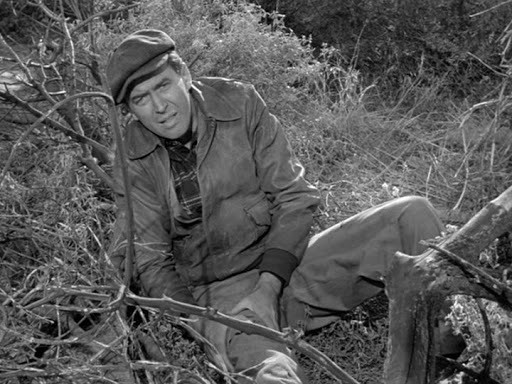
A career-ending tragedy? Not so fast. Pitcher Monty Stratton (James Stewart) gets a new leg up in The Stratton Story.
Stewart looks credible as a strapping right-hander, and the baseball action, buttressed by actual Major Leaguers Gene Bearden, Hall of Famer Bill Dickey, and Jimmy Dykes, seems close enough, but The Stratton Story is really the story of Monty and Ethel, who stands firmly by her man, and the natural, engaging chemistry between Allyson and Stewart is the true all-star here as Adolph Deutsch's eager score never fails to accent noticeably. Wood's sharp direction, framed in Harold Rosson's clear black-and-white photography, builds to the requisite big-game climax, but that carries poignancy as The Stratton Story triumphs thanks to the winning Allyson-Stewart battery.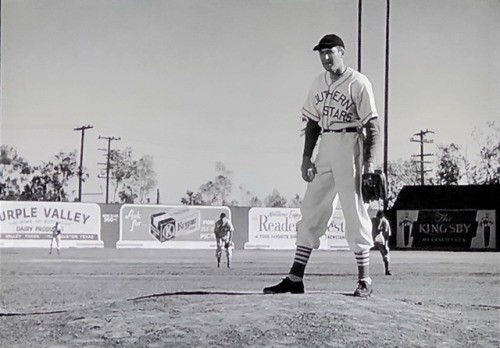
At least Stewart looks like a ballplayer in The Stratton Story. Just don't bunt on him because that's really hitting below the belt.
Already we've seen another standard trope, that of the unsung person, typically a woman, standing behind the prominent man, whether it's Monty's wife Ethel here, or Pete Alexander's wife Aimee in The Winning Team, or Lou Gehrig's wife Eleanor in The Pride of the Yankees, or even Babe Ruth's wife Claire in The Babe Ruth Story. But sometimes the prominent man doesn't have a positive source behind him, and in the case of Jimmy Piersall, he has a psychological impediment hampering him further still.
A two-time Gold Glove center fielder notably for the Boston Red Sox, which he represented in two All-Star games, Piersall, early in his Major League career, displayed erratic behavior that could become violent, such as picking fights with opponents and teammates alike; this was described as "nervous exhaustion" at the time but was symptomatic of bipolar disorder, which Piersall described in his 1955 book Fear Strikes Out, co-authored by Boston sports writer Al Hirshberg, which in turn became the basis for the movie Fear Strikes Out (3.1 WAR) that stars Anthony Perkins as Jimmy Piersall.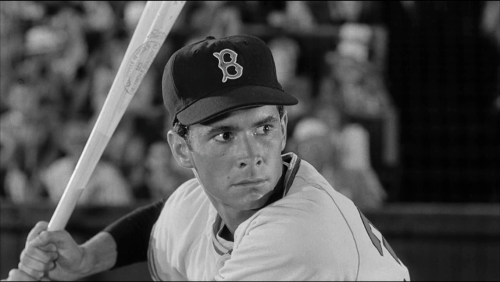
Anthony Perkins looks like he's afraid he'll strike out in Fear Strikes Out as he portrays Boston Red Sox outfielder Jimmy Piersall.
Director Robert Mulligan and screenwriters Ted Berkman and Raphael Blau take dramatic license with Piersall's story—to the point that Piersall ultimately dismissed the film—while Perkins, an unlikely-looking specimen as a ballplayer, does have his scenery-chewing moments that strain credulity. On the other hand, Perkins does make Piersall's episodes persuasive by displaying great range, shifting seamlessly from self-effacing to cocky to paranoid and pugnacious to reflect Piersall's churning state of mind. His performance, then, provided the model for his unassuming young man who can turn psychotic in the blink of an eye, a successful approach but one that, unfortunately, left Perkins typecast after he made that transformation immortal in Psycho three years later.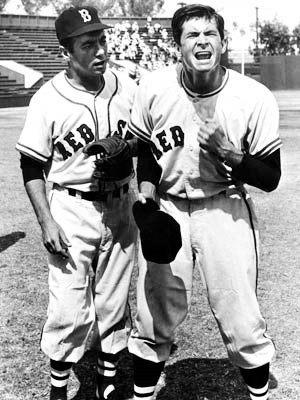
Save some of that for Psycho, Tony. Anthony Perkins (right) in Fear Strikes Out.
Mulligan's film makes it clear from the outset that Piersall's stresses stemmed from his father John (Karl Malden in an equally impressive performance), who pushed Jimmy to baseball greatness from boyhood (Peter J. Votrian plays the young Jimmy) and who withheld approval for anything less than perfection. The duel here is between Perkins and Malden, as Norma Moore (as his wife Mary) and especially Perry Wilson (as his mother) are kept on the bench, although Adam Williams as the doctor who engineers Piersall's breakthrough gets an at-bat. The actual baseball action in Fear Strikes Out waits in the on-deck circle while the psychological drama strides to the plate, gets on base—but fails to score in this mildly interesting baseball melodrama.
The one fictional baseball movie in this set, Angels in the Outfield (3.7 WAR), even has a supernatural premise, but it and the actual baseball action are surprisingly plausible. In the latter instance, that's because there are real baseball players in the action, including Hall of Famers Ralph Kiner, Pie Traynor, and Paul Waner (although only Kiner, an active player at the time, is actually out on the field), while Hall of Famers Joe DiMaggio and Ty Cobb make wry cameos along with actor and crooner Bing Crosby.
And in case you're noticing a pronounced Pittsburgh Pirates influence—Kiner, Traynor, and Waner all played for the Pirates, while Crosby was a part-owner at the time—that's because divine intervention does come to Pittsburgh to help the hapless Pirates score on the baseball diamond thanks to a little girl's prayers, but the biggest beneficiary may be the team's pugnacious manager Guffy McGovern (Paul Douglas), just as apt to throw a punch as unleash a string of obscenities in this winsome, modest comedy.
Dorothy Kingsley and George Wells scripted Richard Conlin's story that succeeds through suggestion rather than exhibition, puckishness rather than piety, with Douglas gliding from surly belligerent to serene surrogate with sly agility and surprising believability as the Pirates' fortunes rise—recall that Douglas made a memorable start in our Vintage Era baseball movie It Happens Every Spring. Already under fire by boo-birds like broadcaster Fred Bayles (Keenan Wynn), whom he helps to get fired, Guffy is assailed by pinch-hitting reporter Jennifer Paige (an engaging Janet Leigh), usually the "Household Hints" editor, in an article that gets her into the sports-page lineup.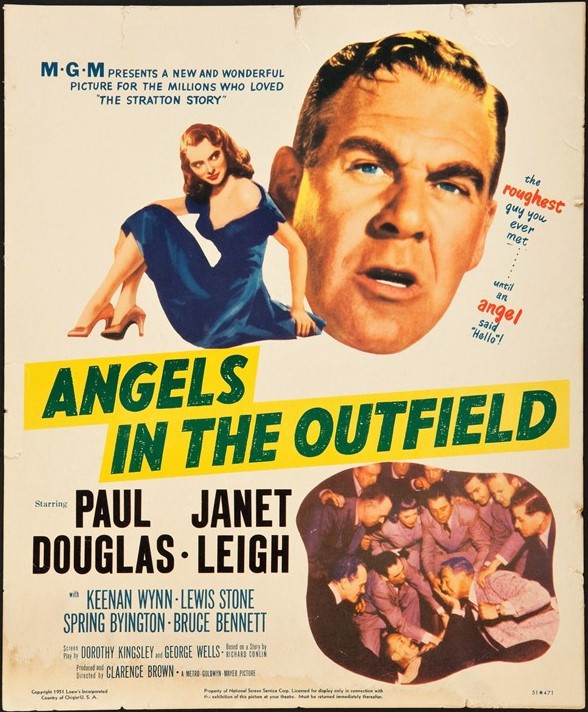
Sentiment and supernatural assistance--yet Angels in the Outfield (1951) avoids being gloppy or corny.
But Guffy has an ally: orphaned moppet Bridget White (quietly adorable Donna Corcoran), whose fervent prayers for him and the Pirates moves an unseen angel (voiced by James Whitmore) to promise Guffy some heavenly help if he cleans up his act. And when Bridget claims to see angels on the playing field, Jennifer's story reporting it becomes a sensation—prompting still-resentful Bayles to clip Guffy's wings when he calls in Commissioner of Baseball Arnold Hapgood (Lewis Stone) to investigate Guffy's odd behavior.
With credible on-field action, Angels in the Outfield, shot at the Pirates' then-home ballpark Forbes Field, flashes authenticity although producer-director Clarence Brown's focus is ultimately on the off-the-field story that brings Guffy, Jennifer, and Bridget together as a touching, albeit unconventional, unit refreshingly free from bathos or sentimentality, although Bruce Bennett's fate as an over-the-hill pitcher supplies poignancy, making Angels in the Outfield more heartwarming than the gloppy contrivances of Field of Dreams—which we'll get to shortly. (Speaking of gloppy, I have not seen the 1994 remake of Angels in the Outfield, but as it's a Walt Disney movie I shudder to think of the layers of sentimental syrup that drown the premise.) Finally, keep an eye out for Barbara Billingsley, later to play June Cleaver in the sitcom Leave It to Beaver, in an uncredited minor role. (Hint: Look in the restaurant scenes.)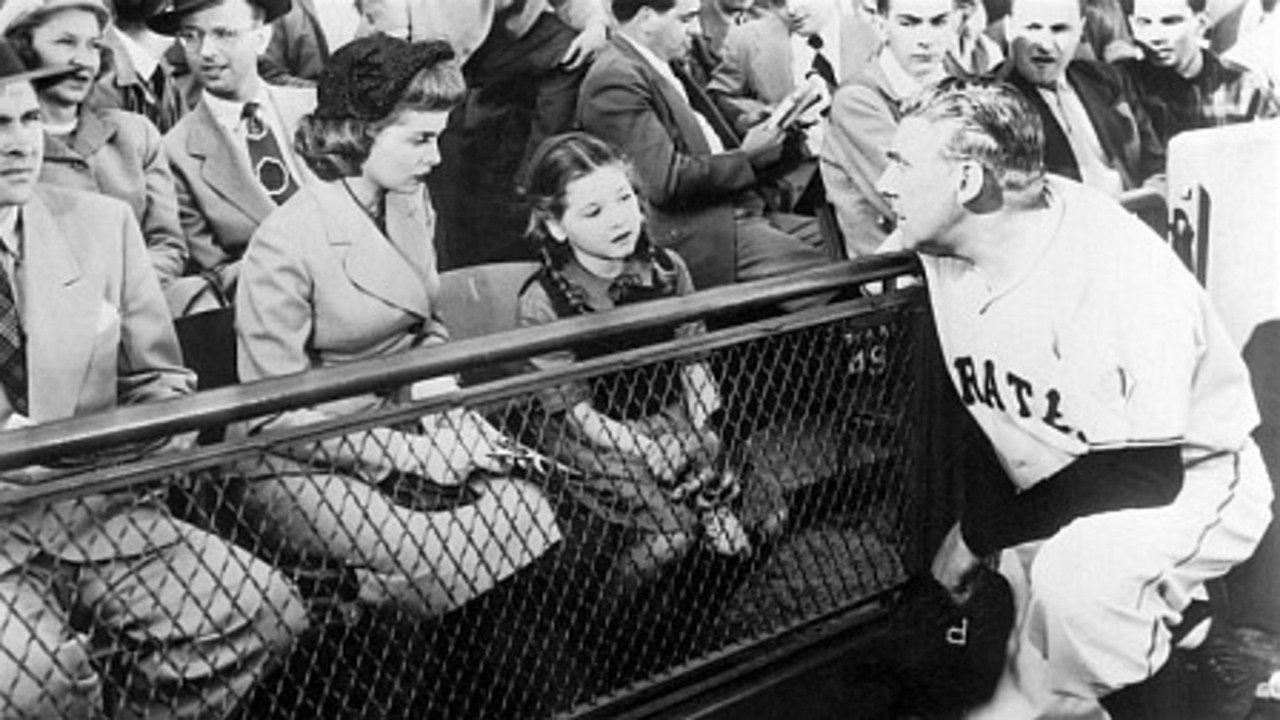
A touching, albeit unconventional, team (L-R): Janet Leigh ("Jennifer Paige"), Donna Corcoran ("Bridget White"), and Paul Douglas ("Guffy McGovern") discuss whether there really are Angels in the Outfield.



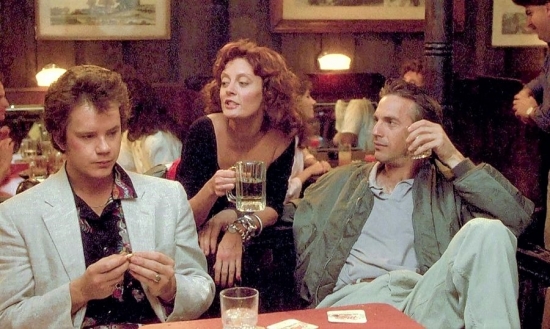
Comments powered by CComment